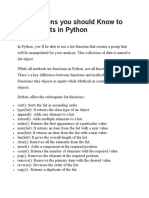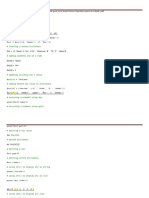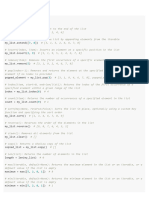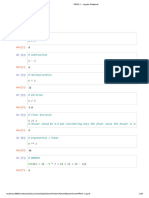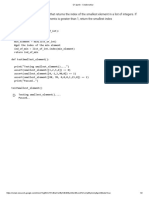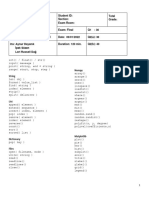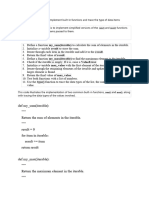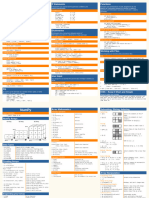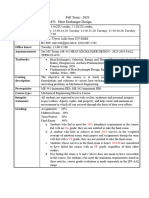8/28/25, 1:19 ML-LAB 01.
ipynb -
PM Colab
1. perform
insert,remove,append,len,pop,clear in a list
saptarshi das - 2447028
arr = [1,2,3]
arr.insert(1,1000)
arr.remove(2)
arr.append(12
) len =
len(arr)
arr.pop()
print(arr)
arr.clear()
print(arr)
[1, 1000, 3]
[]
2. dictionary
Double-click (or enter) to edit
hash =
{1:"shubham",2:"ashish",3:"saptrishi",4:"saurabh",5:"tanay"}
for name in hash:
print(f"{name} : {hash[name]}")
hash.get(1)
hash[2] =
"changed"
print(hash)
# length =
len(hash) #
print(length)
1 : shubham
2 : ashish
3 : saptrishi
4 : saurabh
5 : tanay
{1: 'shubham', 2: 'changed', 3: 'saptrishi', 4: 'saurabh', 5: 'tanay'}
3. tupple
tup = (1,2,3)
print(tup[1])
for item in
tup: if item
== 2:
print(True)
break
print(tup)
2
True
(1, 2, 3)
4. largest in n numbers
import sys
def
largest(*numbers):
max = -
sys.maxsize-1
https://colab.research.google.com/drive/ 1/
1f_fDU2c_twBGJ9NIGSMYbR2jPtfNP1Es#scrollTo=BY1WP8Hq0hWm&printMode=true 3
�8/28/25, 1:19 ML-LAB 01.ipynb -
PM Colab
for num in
numbers: if num
> max:
max = num
return max
largest(1,2,5,4)
https://colab.research.google.com/drive/ 2/
1f_fDU2c_twBGJ9NIGSMYbR2jPtfNP1Es#scrollTo=BY1WP8Hq0hWm&printMode=true 3
�8/28/25, 1:19 ML-LAB 01.ipynb -
PM Colab
5. compare list
def compareList(list1,list2):
return
list1==list2 list1 =
[1,2,3,4]
list2 = [1,2,5,4]
compareList(list1,list2)
False
6. filter()
numbers = [x for x in
range(21)] def is_even(num):
return num % 2 == 0
even_numbers_iterator = filter(is_even, numbers)
even_numbers_list = list(even_numbers_iterator)
print(even_numbers_list)
[0, 2, 4, 6, 8, 10, 12, 14, 16, 18, 20]
numbers = [x for x in
range(10)] def double(num):
return num*2
double = map(double,numbers)
new_list = list(double)
print(new_list)
[0, 2, 4, 6, 8, 10, 12, 14, 16, 18]
7. reduce()
from functools import reduce
numbers = [x for x in range(3)]
l = reduce(lambda
x,y:x+y,numbers) print(l)
https://colab.research.google.com/drive/ 3/
1f_fDU2c_twBGJ9NIGSMYbR2jPtfNP1Es#scrollTo=BY1WP8Hq0hWm&printMode=true 3









